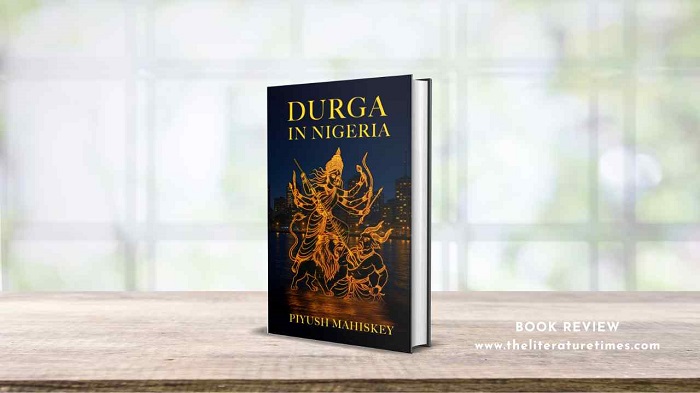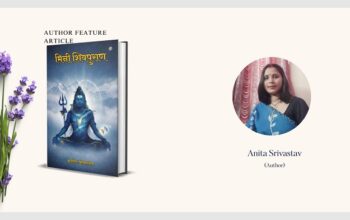Author: Piyush Mahiskey
Publisher: Astitva Prakashan (2025)
Total Pages: 173
Reviewed By: Neel Preet
In this incredibly-remarkable title, “Durga In Nigeria” author Piyush Mahiskey presents an extraordinary confluence of myth, modernity, faith, and emotional reckoning, crafting a deeply layered novel that defies the easy categorisation. Rooted in the spiritual and emotional landscapes of both India and Nigeria, this haunting narrative examines love, betrayal, trauma, and transcendence through the intertwined lives of its two central characters — Anant Joshi and Saanidhya “Saani” Ashtankar. What begins as a seemingly ordinary tale of displacement and the forbidden intimacy soon transforms into a meditation on divinity, redemption, and the human need to find meaning in suffering. Besides, the manner in which the author had carried out the task of storytelling in his book is captivating enough to make the readers quench for more with every turn of the page, and this is something that actually makes this title reading worthy!
Author Piyush Mahiskey is a novelist and Technology Architect based in Nagpur, India. A graduate of S.F.S. High School, YCCE College (B.E. in Electrical Engineering), and BITS Pilani (M.Tech. in Software Systems), he blends technical clarity with literary restraint to craft fiction that listens more than it speaks. His debut novel, ‘Durga In Nigeria’ explores the diaspora rituals, emotional inheritance, and the quiet reckoning of identity through a lens that refuses spectacle. Set against the backdrop of Navratri and Dusshera in a Nigerian city, the novel is a meditation on silence, memory, and myth — written with cadence, not confession. By day, Piyush leads digital transformation initiatives at Infosys Nagpur, where his expertise in full-stack development and software architecture informs his narrative structure. By night, he writes with emotional precision, often revising deep into the quiet hours. Whereas, this particular title, “Durga In Nigeria” is published by Astitva Prakashan and is released during the period of October 2025. Also, the book is available in both paperback as well as in e-book format and the readers can find this title on all the top online marketplaces.
The title, “Durga In Nigeria” opens with Anant Joshi’s journey from Pune to Lagos, a move that signifies both professional ambition and emotional escape. Leaving behind his wife Roshni and young son Kush, Anant steps into a foreign world that feels simultaneously vibrant and isolating. In Lagos, he meets Saani Ashtankar, a disciplined and emotionally restrained product strategist whose worldview is grounded in logic rather than faith. Their bond begins as a professional partnership but gradually deepens into something sacred and unspoken — a companionship that transcends the conventional boundaries of the romance or morality. Yet, it is precisely this connection that sets into motion a devastating chain of events, culminating in betrayal, guilt, and rebirth — both literal and symbolic. Told with emotional precision and poetic restraint, the book is a soul-stirring narrative where the personal becomes mythic, and where divine mercy manifests not in temples but through trauma!
On top of that when Saani’s near-death experience in the Lagos lagoon becomes the axis of the narrative, the story takes on a mythic dimension. Bloodied, broken, and hovering between life and death, she encounters something ancient and maternal — an embodiment of Durga, the goddess of strength, protection, and destruction. Interestingly, author Piyush Mahiskey’s portrayal of this particular moment is neither overtly religious nor melodramatic; instead, it unfolds with quiet inevitability, as though Saani’s trauma has become the threshold for divine revelation. From that point onward, the novel explores how faith migrates through trauma, how divinity manifests not in the temples but in the moments of human collapse. As Saani rebuilds her identity and Anant returns to India burdened with a secret too heavy to confess, ‘Durga In Nigeria’ becomes a story of dual awakenings. Anant’s guilt transforms into a slow erosion of self — a spiritual decay that mirrors his emotional emptiness. Meanwhile, Saani’s silence, once a marker of pain, becomes sanctified by those who see in her survival a miracle.
One of the Notable Strengths of this title, “Durga In Nigeria” is its ability to reinterpret divinity through human experience. Durga is not an external deity descending from myth; she is born from within Saani’s pain, rage, and rebirth. Her transformation into a public symbol of divine revelation across India reflects how societies often create gods out of trauma — deifying survivors while failing to understand their suffering. The final chapter, “Godwoman” encapsulates this paradox beautifully, as Saani’s silence is reinterpreted by the world as wisdom, her restraint mistaken for prophecy. Author Piyush Mahiskey’s prose is restrained, poetic, and emotionally precise. He avoids sensationalism, choosing instead to craft a quiet, meditative narrative where the most powerful moments emerge from glances, pauses, and rituals rather than dramatic declarations. The language bridges the technical with the spiritual metaphors from the modern life blend seamlessly with references to the Hindu cosmology, creating a unique rhythm that feels both grounded and ethereal. Meanwhile, the cultural threads from India, like the Navratri rituals, Marathi sensibilities, and devotional refrains run like a spiritual echo through the text, reaffirming that faith, like love, refuses confinement to geography!
Stylistically, beneath its metaphysical surface, “Durga In Nigeria” remains a profoundly human story. The emotional arcs of Roshni and Kush — Anant’s wife and son add tenderness and complexity to the narrative. Roshni’s steadfast faith contrasts with Anant’s spiritual disillusionment, while young Kush’s symbolic presence embodies innocence and continuity in a world fractured by adult choices. These parallel storylines deepen the emotional resonance of the novel, grounding its philosophical inquiries in lived reality.
Now, upon reaching the final part of the review, i.e. the Book Verdict, we can conclude that a title like “Durga In Nigeria” is for sure a reading worthy title. The book deserves a chance by the readers as it is truly luminous and a deeply introspective novel that bridges the gap between the sacred and the secular, the personal and the divine. With its emotionally intelligent prose, layered symbolism, and profound exploration of guilt, faith and transformation, it stands as one of the most compelling works in contemporary Hindu-inspired fiction. This is not a story of gods descending to save humans — it is the story of humanity discovering the divine within itself. Ultimately, “Durga In Nigeria” is not a commentary but a meditation on the emotional truth — an exploration of how love, faith, and guilt intersect in the modern world, which makes it a MUST READ in all true sense!
Book’s Link: https://www.amazon.in/dp/937002400X



